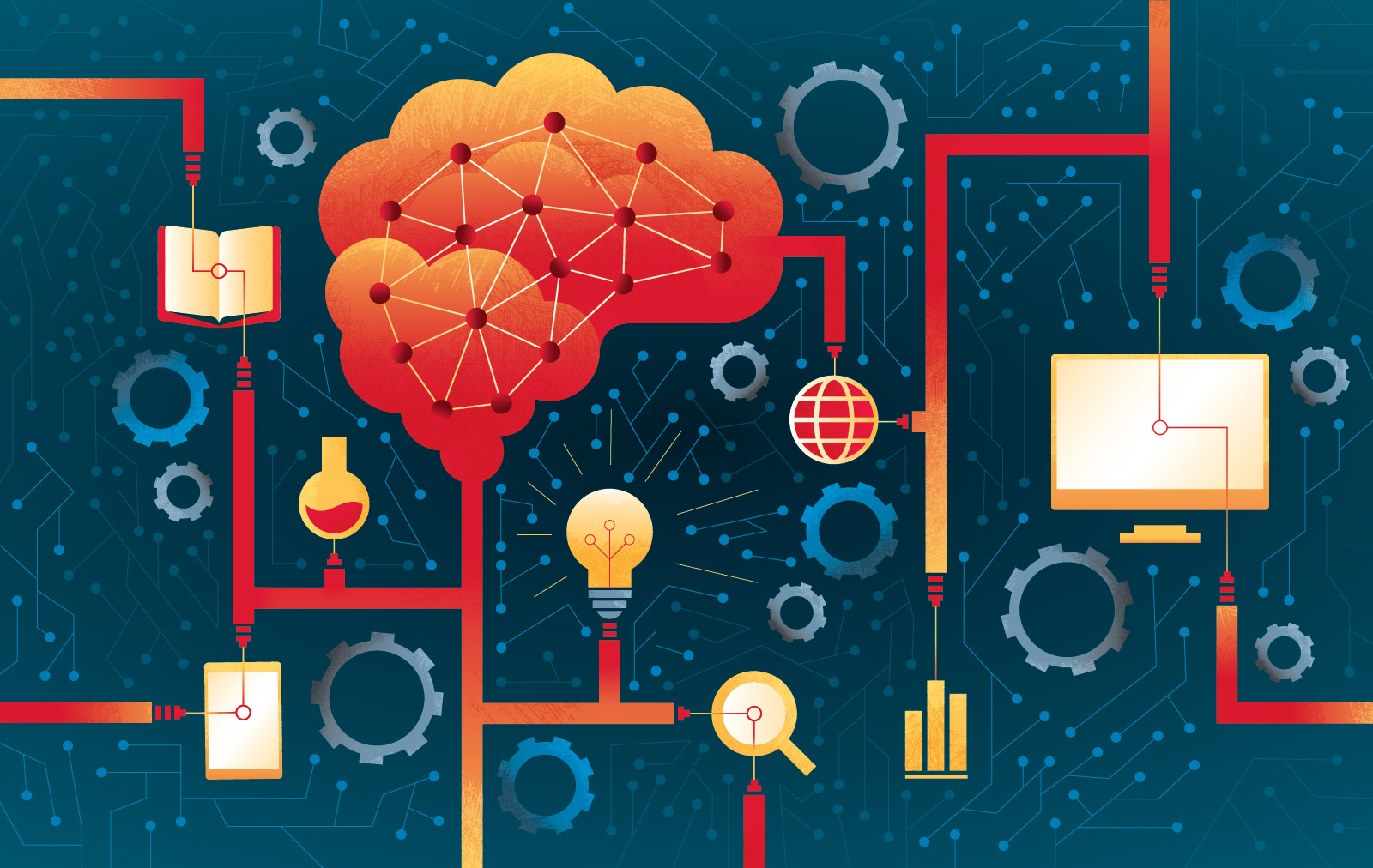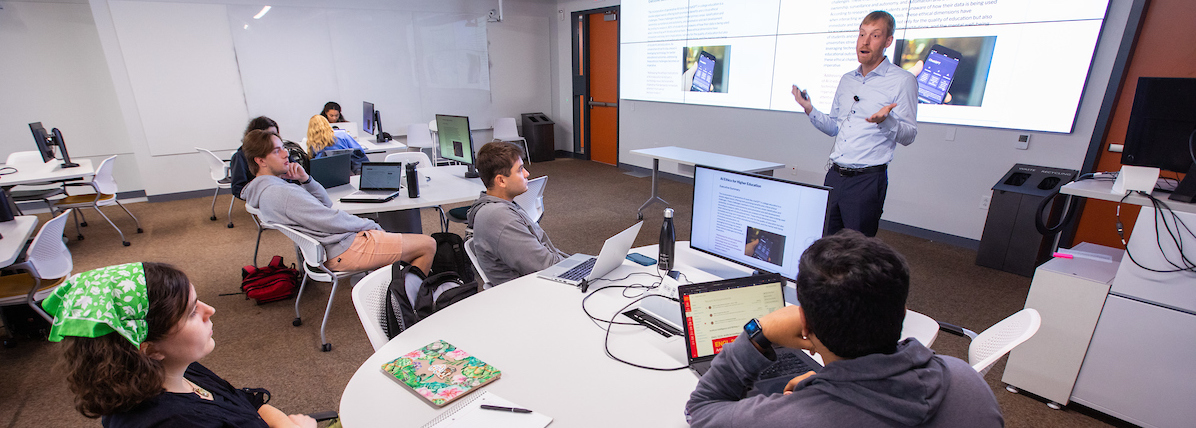Innovative AI
Navigating the realm of advanced machine learning
Story by M. Monica Gillen, Illustrations by Haylee Sheppard, Photo by Christopher Gannon

Story by M. Monica Gillen, Illustrations by Haylee Sheppard, Photo by Christopher Gannon

Technology advances at warp speed. Something emerges as influential, then moments later, it seems, the next transformative tech arrives. “AI is probably the most disruptive technology, ever,” said Elon Musk at VivaTechnology, a leading event for technology innovators and startups in Paris this June. Artificial intelligence (AI) will affect most aspects of the world, including education. Iowa State University faculty and staff are responding in real time to best prepare students for this new future.
Artificial intelligence (AI) is an advanced computer program designed to interact with humans and imitate or simulate human behavior. It can generate text for everyday things like writing papers, answering questions, solving equations, even following a recipe. Other AI applications can generate images, audio, and music.
So, what is a computer program? Programs give instructions, like those you might offer a person learning to make a peanut butter and jelly sandwich. You gather the bread, peanut butter, jelly, and a knife, and in a few basic steps, you have lunch. With computer programs, code is used to give instructions. Imagine searching the internet for suggestions: restaurants near me. The search engine, like Google or DuckDuckGo, uses computer programs to comb through an immense amount of information to find relevant results near your location.
ChatGPT is a widely known AI application used for generating content based on context and past conversations built into the language model. A CEO or a college student could prompt an AI application to write a letter or generate presentation talking points. The user starts a chat by typing desired information: welcome new employees; apply for a job. The application produces a response, and if the tone doesn’t quite match the speaker’s, the user can fine-tune it.
Instruction librarians and staff of the University Library have taught students about information literacy for 133 years through Introduction to College Level Research, known as Library 160. The course remains agile with content refreshed and modernized as needed, to embrace new processes, terms, and technologies—like AI.
Rano Marupova is the lead of the University Library instruction services unit. She enjoys exploring a variety of AI applications like ChatGPT, Bard (Google’s version), and Adobe Firefly for image generation. She recognizes students will use AI tools in their coursework and stresses that instructors need to teach with this in mind.
“Due to AI’s ability to quickly respond to user queries and create content, students will use these tools in their coursework,” Marupova said. “As educators, we must teach our students how to use information generated by these tools critically and ethically, and it naturally aligns with the major course learning objectives of our information literacy course.”
The library’s team of information literacy instructors conveys a clear message to students that they need to evaluate all information they discover to ensure it’s accurate and credible, regardless of the source. This semester the Library 160 curriculum will introduce AI in the context of evaluating information. Google, Bing, or DuckDuckGo may seem smart and reliable; however, the search engine doesn’t get to decide what’s valuable. It’s up to the student or researcher to appraise and inspect the results.
Rano Marupova, Lead, Instruction Services
Abram Anders, associate professor and interim associate director of the Student Innovation Center, started watching and experimenting with early AI tools in 2022. Now he uses them to do things like generate ideas and outlines for research. This semester, Anders is teaching an experimental course, Artificial Intelligence and Writing (English 222X). As in Library 160, he will address the ethical and reliability concerns of the technology in the context of AI used in coursework.
“By January of 2023, I realized it would be extremely valuable to develop a course like English 222X to get at the forefront of this emerging technology,” Anders said. “As I surveyed the emerging pedagogical literature, I became convinced the best way to experience AI tools was through creative challenges to help students take a lead role in exploring and evaluating successful uses.”
Anders said his students can fully engage with artificial intelligence for his course, but makes it clear to them this expectation will vary from course to course and instructor to instructor. Some may not permit their use at all.
The Center for Excellence in Teaching and Learning (CELT) added AI in Teaching to their online resources for Iowa State instructors. The center offers tools for syllabi and assignments to ensure students understand instructor expectations regarding AI tools.
The new Translational AI Center at Iowa State serves as the scientific hub for the technology on campus, bringing together core Iowa State artificial intelligence researchers and subject matter experts interested in applying new technologies to their work.
And the Department of Computer Science launched a Master of Science program in artificial intelligence in 2021 – the first of its kind in Iowa. Students learn to enable computers to understand, make predictions, and consider broader applications of AI technologies.
Anders encourages others to join the fun and engage with AI tools.
“When you work with AI tools, it quickly becomes clear they are valuable and fun, and they cannot replace our own human intellect and agency,” Anders said. “It's one thing to imagine and another thing to experience.”

Iowa State AI expert Abram Anders says such tools are valuable, but it’s clear they can’t replace human intellect and agency. He teaches a new experimental course for undergrads Artificial Intelligence and Writing.
John Vincent Atanasoff (1903-1995) links the ones and zeros from the origin of the computer to artificial intelligence. In 1939, Atanasoff received a $650 grant from then Iowa State College to begin constructing the computer he’d been imagining for years. He and student, Clifford E. Berry, developed the ABC computer. Many of the ideas used in modern computing started with Atanasoff and Berry.